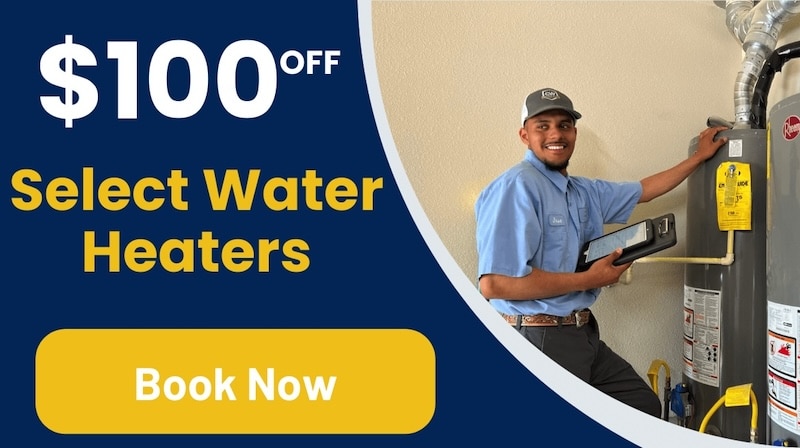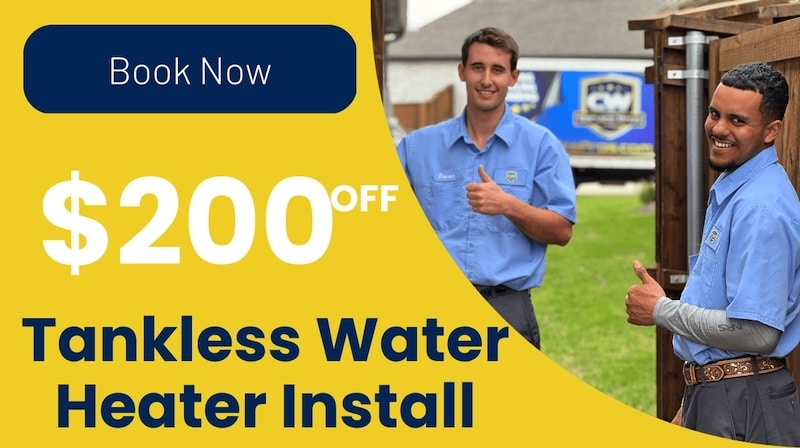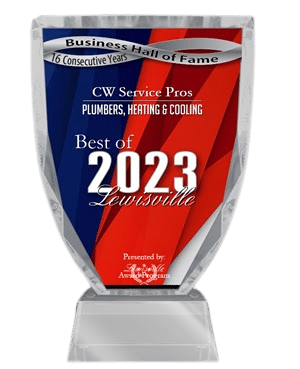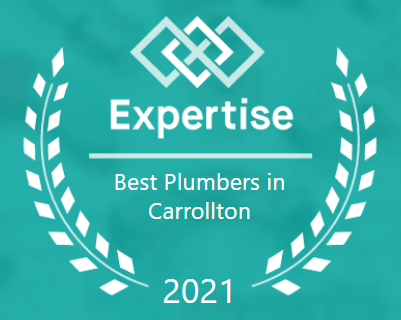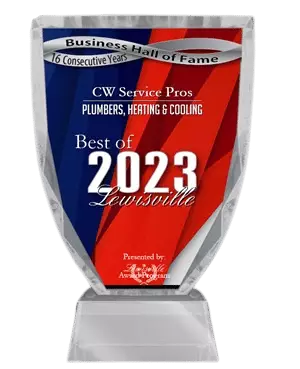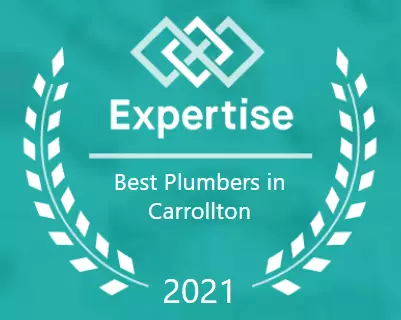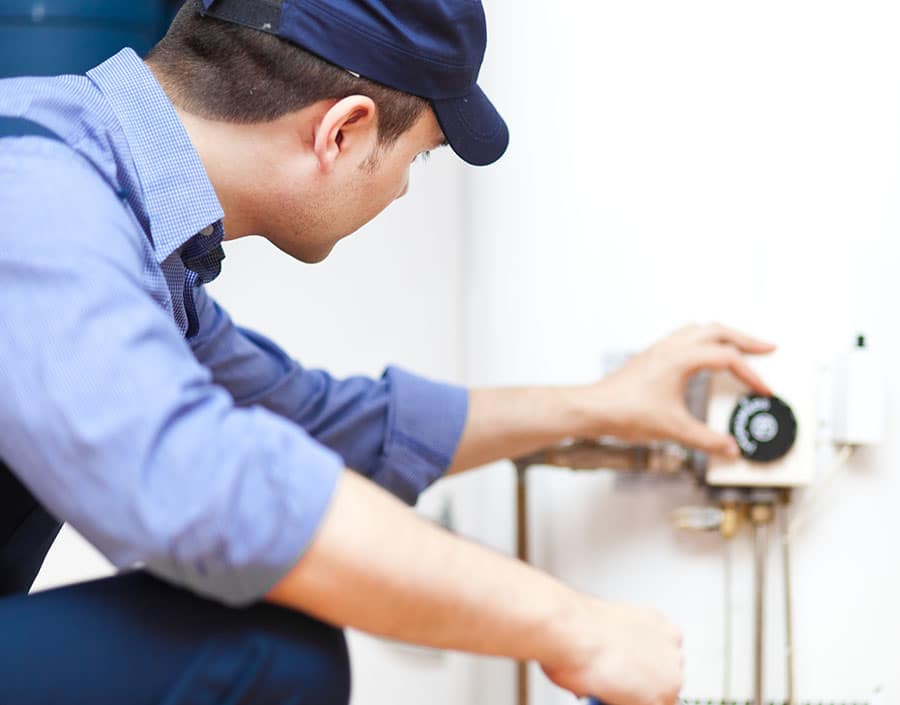
Call CW Service Pros for North Texas Water Heater Repair
Reliable hot water is one of the most important comforts of home, and it’s not just a luxury. A lack of hot water can bring a household to a screeching halt: Family members can’t shower before work or school. Without hot water, it’s harder to keep dishes, clothes, and surfaces clean. We know that when our customers call with water heater problems, they rely on us for a quick solution.
That’s why one of our most important aims is to provide same-day water heater repair appointments whenever possible. The sooner we send a plumber to your home, the sooner you get your hot water back, and the sooner life goes back to normal.
Hot Water Heater Repair or Heater Replacement: Which Option Is Right for You?
When you’re dealing with hot water tank problems, there’s not always a clear-cut solution. In some cases, water heater repair is the right thing to do. In others, the best fix is to replace your old hot water tank entirely. How do you know which option is the right one? Consider the following questions:
How old is your existing hot water tank? If the tank is almost at the end of its lifespan of 8 to 12 years, it may not make sense to invest in repairs.
Why did it break down? Was there a specific reason, or is it just that parts are wearing out due to age? A licensed plumber can make sure you know the answer to this.
Does your current hot water system meet all your family’s hot water needs? If not, that’s another reason to consider replacing your existing hot water tank.
What are the costs? What are the costs of North Texas water heater repair vs replacement? This depends on what makes the most sense, considering:
- The age of the existing tank
- The condition of the existing tank
- Your family’s needs
- Your budget
For more information about replacement and repair costs, call CW Service Pros. We can help you decide on water tank repair or replacement, we’ll be happy to perform any work that’s needed.
4 Common Problems with Hot Water Heaters
Sometimes solving your hot water problem is as simple as adjusting the thermostat. If your hot water tank issue persists or you prefer to handle it professionally, call CW Service Pros. We offer expert advice and the best hot water tank repair in North Texas!
1. Hot Water Smells Strange
If there’s corrosion on your water tank or on associated pipes and fittings, they need to be replaced. These jobs can be done by an experienced CW Service Pros plumber.
If your hot water smells strange or you notice an odd smell when you turn on the hot tap, an overgrowth of bacteria could be to blame. This is often the cause of sulfur smells in hot water. One way to deal with bacteria is to increase the tank’s thermostat to 140 degrees Fahrenheit . This higher water temperature will kill any bacteria in the tank within a couple hours.
CAUTION: Water that’s 140 degrees is hot enough to cause third-degree burn injuries after just a few seconds of contact. If you choose to try this solution, make sure everyone in the house is aware of the temperature change and that young children don’t have access to hot water.
After a couple hours at this higher temperature, return the thermostat to its normal setting. Wait overnight for the water temperature to return to normal. In the morning, test the water temperature before anyone jumps right into a hot shower or bath.
If the smell persists, it’s time to call a plumber, as the hot water heater tank may need flushing or replacing before the tank fails.
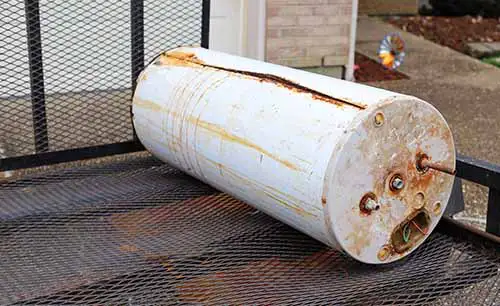
2. Tank Reheats Very Slowly
If you’re waiting a long time for your water tank to replenish its supply, your thermostat may be set too low. Alternatively, your hot water tank may be too small for your family’s daily usage.
3. Hot Water Pressure Is Too Low
Low water pressure may be due to partial clogs in pipes or faucets. If the problem is confined to one showerhead or faucet, cleaning that fixture may solve the issue. Occasionally, though uncommon, a clog can occur in the water line itself. In this case, a plumber may be needed to resolve the issue.
4. Water Temperature Is Inconsistent
If your water is not consistently getting hot enough, the thermostat may be faulty. This could be due to a dirty or broken thermocouple (the part of a thermostat that senses temperature). Cleaning or replacing it may solve the problem.
Hot Water Tank vs. Tankless Heater: Which Is Right for You?
Conventional Water Heaters: A standard water heater is a metal cylinder that holds up to 80 gallons of water. The tank has an intake valve at the bottom where cold water enters. Within the tank is a heater element that gets hot when the tank is on. The heating element heats the water over several hours. When hot water is needed, it’s delivered to the plumbing system via an outlet at the top of the tank.
Tankless Hot Water Systems: In contrast, a tankless heater doesn’t have a storage tank. Instead, these small units contain a powerful heater capable of heating water instantly and on demand. When you need hot water, turn on the faucet, and the tankless unit heats the water immediately.
So which hot water option is right for you? Endless water on demand makes the tankless water heater an attractive option. Tankless systems are especially useful when installation space is limited. A hot water tank is an affordable all-purpose option, provided you have the space for installation and choose a tank size that’s adequate for your family.
Traditional Water Heaters:
- Immediate supply of hot water is limited
- Electric water heaters last 12 to 15 years
- Gas water heaters last 8 to 12 years
- Lower up-front cost
- Higher operating costs
- Less energy-efficient than tankless systems, though options such as solar tanks and heat pump tanks improve on standard tanks for energy efficiency and operating costs
- Need more installation space
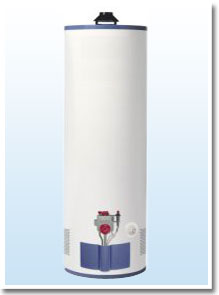
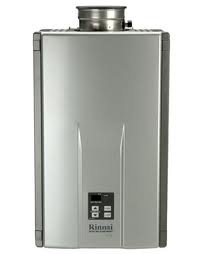
Tankless Heaters:
- Endless supply of hot water
- Lifespan of up to 20 years
- Higher up-front cost
- Lower operating costs
- Water heated on demand, so no energy wasted keeping water hot
- More energy-efficient
- Low space requirements

FOR THE BEST TEXAS WATER HEATER REPAIR AND REPLACEMENT CHOOSE CW SERVICE PROS
Installing a new hot water is a significant investment. It’s worth taking the time to make sure the installation team you work with is the very best. In Plano, Carrollton, and other DFW neighborhoods, CW Service Pros offers a premium combination of skills, experience, and great customer service!
We can help you choose the best electric or gas water heater for your home, whether it’s a tank heater or a tankless water heater. We’ll make sure you have plenty of hot water for your family’s needs, while meeting any other requirements you have. Once you’ve picked a tank, we’ll perform the installation and get you up and running with your new hot water system. We’ll even haul the old tank away for you, free of charge!
Why Choose CW Service Pros for DFW Hot Water Tank Services?
Simply put: Because we’re the best at what we do! CW Service Pros has been dedicated to plumbing excellence since 2000. We’ve worked hard for over 20 years, and we’re proud to offer water heater repair services in Carrollton, Plano, Lewisville, and many other DFW neighborhoods.
- Prompt appointments: We offer same-day appointments.
- Call 24/7 for emergencies: If you have a plumbing crisis, you can count on our help at any time.
- Friendly and professional: Our technicians are experts in both plumbing and customer care.
- Clear and up-front pricing: Once we assess your case, you’ll receive a written estimate for plumbing repair or installation.
- Quality brands: We only work with brands we trust, including Rheem®, Rinnai®, and Noritz®.
- Warranties: We offer warranties, including extended warranties, for parts and labor.
- Permits and inspections included: If your water heater repair job needs an inspection or permit, we’ll take care of that too.
- Financing flexibility: More flexibility gives you more options.
- Satisfaction guaranteed: We take care to maintain a safe and clean worksite. If you’re not satisfied with our water heater repair work, we’ll stay on the job until you’re happy.
Electric Hot Water Tanks vs. Gas Hot Water Tanks
Most hot water tanks run on electricity or gas. Each method has pros and cons, so often this choice comes down to practicality and running costs.
Electric Tank Water Heaters:
- Heat water with a high-voltage heating rod centered inside the tank
- Lifespan of 12 to 15 years
- Cleaner and safer
- Heat water slowly but more efficiently
- A wider range of tank size options
- Lower purchase cost
- Higher operating costs
- No pilot light to manage
- Hot water unavailable during a power outage
Gas Tank Water Heaters:
- Heats water with a gas burner located at the bottom of the tank in a separate sealed compartment
- May require the installation of a new gas line
- Lifespan of 8 to 12 years
- Generates combustion gases that must be vented outdoors
- Runs on highly flammable natural gas
- Higher purchase cost
- Lower operating costs
- Pilot light may need relighting
- Hot water still available during a power outage
CW Service Pros Testimonials

Highly recommend Devan & CW Service Pros for plumbing issues! Devan is professional, trustworthy, and helped find solutions for a complicated situation.
Jim Parker

CW Service Pros has been my go-to plumbing company for years. Their technician, Johannes, recently repaired my hot water heater efficiently and professionally. I highly recommend CW Service Pros and Johannes to anyone.
Sherri McCarthy

Andrew and Brice were professional, fast, and informative. They helped me understand my slab leak problem and payment options. I highly recommend them
Julie Ballard-Albright
CALL CW SERVICE PROS FOR NORTH TEXAS WATER HEATER REPAIR AND HOT WATER TANK INSTALLATION
Has your supply of hot water dried up or gone cold? Dealing with hot water problems can have a big impact on your comfort and quality of life—so they’re issues you want to solve ASAP! That’s why people in North Texas area trust CW Service Pros for essential plumbing services like water heater repair and hot water tank installation.
Whether you’re interested in upgrading your current hot water system or just want to fix a problem with your hot water supply, CW Service Pros is here to help! Call us, and we’ll send a North Texas licensed plumber out to your home to size up your plumbing situation. For fast and friendly service, and the solution to all your plumbing problems, call CW Service Pros.

Does CW Service Pros Offer Financing?
Yes! In partnership with Synchrony, CW Service Pros offers financing options for purchases, installations, and repairs. Financing terms ranging from 6 months to 132 months with as little as 0% interest and several revolving credit terms. We have options to fit you budget.



